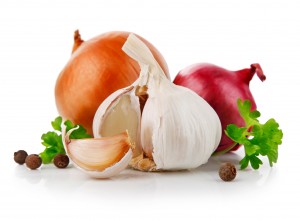
Many of us grow herbs in our garden and only use them for cooking purposes – which is great, but wouldn’t it be wonderful to know which you can safely use to help common and simple ailments? I thought I’d share some information about things that you may find useful in these cold, winter months! Please do remember that the suggestions I make are intended as guidelines only and should not substitute medical advice, if in doubt then please contact your chosen health professional.
Many people wouldn’t class Allium cepa (onion) and Allium sativum (garlic) as herbs, but any plant substance that has medicinal value is classified as such by Medical Herbalists. Onion and garlic, belonging to the onion family, share some common properties useful at this time of year; both are expectorant and antibacterial, helpful for stubborn chesty coughs. A traditional recipe for winter coughs can be made by steeping sliced onion in honey for 48 hours in the fridge. Half a dozen garlic cloves can be added for extra potency if you don’t mind the smell!! The syrup is ready to use after 24 hours but best to leave for the full 48 before you strain it into a sterile bottle. Although not strictly a herb, the honey has its own soothing action to the chest and throat and has anti bacterial action too! The syrup can be kept refrigerated for a couple of weeks and a teaspoon taken up to 6 times daily. As garlic and onion both have hypoglycaemic actions and properties to support the circulatory system, a teaspoon or so taken daily can be a good all round tonic too.
Berries from the Sambucus nigra (elder) tree have been used traditionally at this time of year. Elderberries are proven to be active against the flu virus, are nutritive, have immune modulating properties and are diaphoretic (induce sweating). This can be helpful for chills and fevers. They are anti-viral, anti-oxidant and have been used by herbalists to treat winter coughs, colds and, of course the flu! You can collect your own berries (if you are confident with identification), juice and freeze them to keep a stock at hand. Otherwise bought juice or tincture can be used. Elderberry preparations can be made more palatable (they are sometimes fairly tart!) by adding some warming spices. Heating herbs such as Cinnamomum zeylanicum (cinnamon), Eugenia caryophyllus (cloves), Eletarria cardamomum (cardamom) and Zingiber officinalis (ginger) are all useful for warming up the body to fight the effects of a winter cold. They have the added advantage of being carminative to the digestion too. Try a tasty decoction (simmered infusion) of these warming spices using fruit juice and a little elderberry – you may be surprised, it’s like a non-alcoholic mulled wine – and its good for you too!!!
Lynda Jones BSc (Hons) Medical Herbalist
[…] Winter Herbs | Lynda Jones – Blog […]